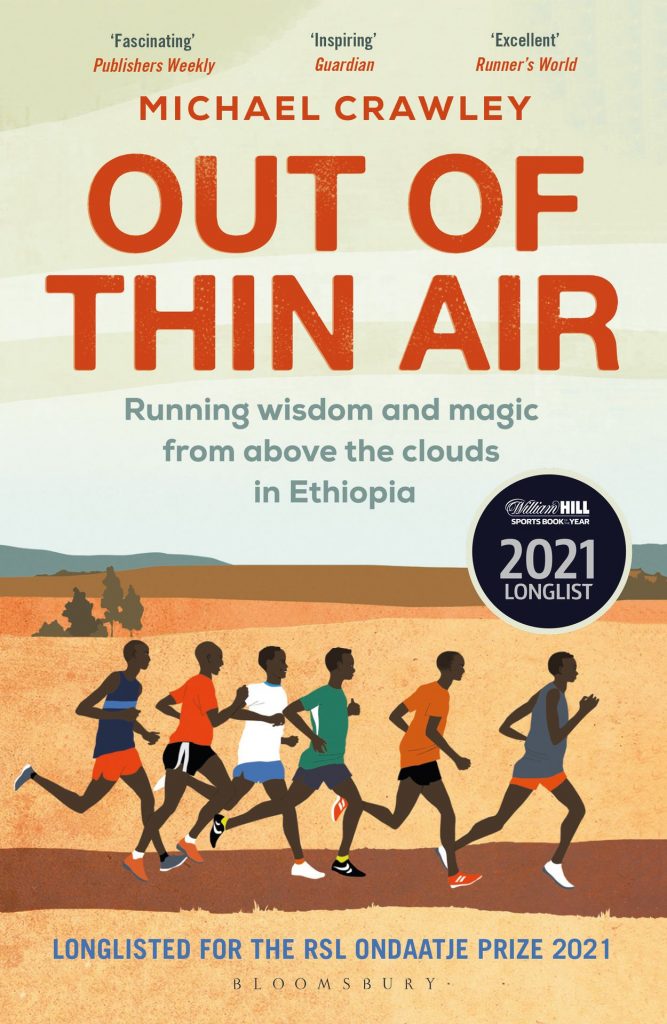‘Out of Thin Air’ Shares How, Not Why Ethiopians Win
‘Out of Thin Air’ Shares How, Not Why Ethiopians Win https://fergushodgson.com/wp-content/uploads/2023/03/thin-out-of-air.png 800 400 Fergus Hodgson https://secure.gravatar.com/avatar/abc4f612eeb70d684c156dd1398fdf06?s=96&d=mm&r=gRunning Story Has More Magic than Wisdom
The glaring dominance of Ethiopian and Kenyan athletes in distance running has spawned a search for explanations and ways to compete. A Scottish gentleman, and handy runner in his own right, went to train in Ethiopia for a year in the mid-2010s and came back with more than a story to tell.
Fortunately, Michael Crawley is a captivating writer who inserts the reader into Ethiopia’s colorful running world, including many hyena stories! Unfortunately, he conveys primarily mysticism and does not subject the assertions in the book to scientific rigor or rational scrutiny.
Out of Thin Air: Running Wisdom and Magic from Above the Clouds in Ethiopia (272 pages, January 2022) offers countless anecdotes and perspectives from Ethiopian runners, coaches, and officials—including celebrities, past and present. However, there is no disentangling of the features, many of them fanciful and confusing, that might have nothing to do with Ethiopian prowess.
On the contrary, Crawley eschews Western attempts to quantify and isolate East African running traits as demeaning. Rather, for his University of Edinburgh doctoral thesis in anthropology, Crawley simply describes Ethiopia the way it is firsthand and in a poetic, reverent fashion. The reader can make up his own mind regarding which Ethiopian habits pay dividends and which do not (or worse, do harm).
A surprising omission is performance-enhancing drugs, which presumably he did not witness during his stay in Ethiopia. Whether that is the case or not, substances such as EPO are an elephant in the room. This problem is not exclusive to one coach or team and was documented in the 2015 film Doping: Top Secret by German journalist Hajo Seppelt. Likewise, the BBC film Catch Me if You Can, also released in 2015, demonstrates EPO’s effectiveness and widespread use.
In fact, during his stay Crawley came across Zane Robertson. He moved with his twin brother from New Zealand when he was 17 to base his training in Kenya and learn from the locals. Robertson’s contention in the book is that East African runners succeed in spite of, not because of, many of their habits and environmental factors. In 2022, after the book’s release, Robertson received an eight-year ban from the New Zealand sports tribunal for EPO doping.
Out of Thin Air does not address whether the Ethiopians succeed on account of genetics, illegal boosters, or training from a young age. However, as the title suggests, it does discuss at length the altitude training that forms an integral part of the locals’ regimen. Altitude appears to be an ingredient crucial to Ethiopian success, not that this is a secret to anyone.
Although there is not a detailed presentation of periodized training plans, other recurring themes merit examination. For example, the Ethiopian athletes always train in groups and frown upon anyone who would dare to do otherwise. In addition, they pursue different landscapes and surfaces for agility and strength.
With phenomenal role models, such as Kenenisa Bekele and Tirunesh Dibaba, Ethiopians see professional running as a realistic, accessible endeavor. Those involved do whatever they can to pursue international prize money and membership in sponsored clubs. Recreation and health are hardly at the top of their minds. Since one needs money to train, and money from running only comes after training, there is a chicken-or-egg problem. That means the professional runners often come from relatively wealthy families who can afford to support their kin at the outset.
Crawley’s “magic” in Out of Thin Air comes not from the training ideas. Rather, it comes from being more than a fly on the wall in a fascinating subculture—one that could not be replicated in North America. (The eight-hour audio version adds even more flavor to the account.) The reader will never look upon Ethiopian runners as he did before; he now has a sense and appreciation for the world from which they have emerged. That world was all I could think of, for example, when I saw them take, in chaotic fashion, the first three places in the 2023 Tokyo Marathon.


